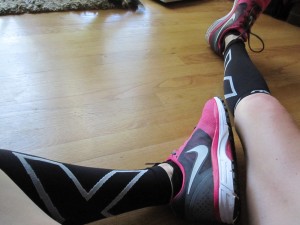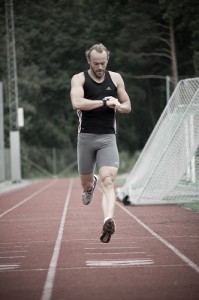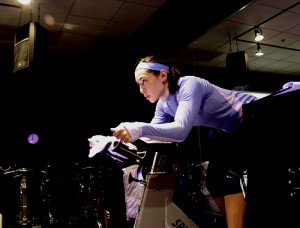 I’m not sure exactly when compression socks made it on the running scene but one article I read credited Paula Radcliffe with being among the first to really introduce them to long distance running. I know a few running friends that run with compression socks (some swear by them) and I certainly see plenty of people at the starting line of races sporting them. I’ve loosely wondered for a couple years what the big deal is and whether or not it’s something I need to try. After reading an article in the July issue of RW that recommended wearing compression socks on a long flight before a marathon, I decided they’d be worth a try if nothing else for the flight from Baltimore to Salt Lake City for the Big Cottonwood Marathon. Continue reading
I’m not sure exactly when compression socks made it on the running scene but one article I read credited Paula Radcliffe with being among the first to really introduce them to long distance running. I know a few running friends that run with compression socks (some swear by them) and I certainly see plenty of people at the starting line of races sporting them. I’ve loosely wondered for a couple years what the big deal is and whether or not it’s something I need to try. After reading an article in the July issue of RW that recommended wearing compression socks on a long flight before a marathon, I decided they’d be worth a try if nothing else for the flight from Baltimore to Salt Lake City for the Big Cottonwood Marathon. Continue reading
Tag Archives: recovery
Interval Awareness

Intervals involve hard runs for short times or distances followed by recovery jogs so it's helpful to have a watch to time each interval. Photo by Michael Lokner.
Until recently, the last time I ran intervals was during track and field practice in high school. I’ve read plenty of articles about interval runs and there are some great folks on Twitter to learn from whose focus is interval training. The last few weeks of my triathlon training plan have included threshold interval work-outs. According to the plan this means to run for three minutes at 5K pace followed by a three minute jog. The first session I repeated this three times and the next three sessions I was to repeat four times. Each interval session begins and ends with a little over a one mile jog which happens to be the distance from my house to the local track, quiet convenient!
The first round of intervals were eye-opening. Even though I’d been preparing my body for speed with strides and tempo runs, attempting to maintain what I thought to be my 5K pace for three minutes was much more challenging than I thought it would be. I’m sure that part of the problem is that I still don’t know my actual 5K pace. My goal pace is 8-minute miles but I have not measured that on the track. I measure my 5K pace by my form, the length of my stride, the little extra push from my arms, and my breathing. I’m so familiar with my 9-minute pace that I feel like I can tell when I’ve pushed past that to something faster and that is what I consider my 5K pace. Continue reading
Running Off Days
 We all know that rest days are important for any kind of training to be successful and learning to appreciate rest days, I’ve found, requires just as much practice as training itself. This winter when I was marathon training I would often experience various levels of guilt on my off days and I know I am not alone. Despite the anxiety I sometimes felt by not running, I knew it was important that my body get a break from the impact and stresses of running.
We all know that rest days are important for any kind of training to be successful and learning to appreciate rest days, I’ve found, requires just as much practice as training itself. This winter when I was marathon training I would often experience various levels of guilt on my off days and I know I am not alone. Despite the anxiety I sometimes felt by not running, I knew it was important that my body get a break from the impact and stresses of running.
I’ve read many articles and heard from a number of coaches and other runners that rest days do not have to be days of complete inactivity. When it comes to running, rest days are anything from a light run to a cross-training activity to weight training to Pilates. I fully admit to having been very inconsistent in how I used to spend my rest days and more often than not would choose to do nothing rather than cross-train. All that changed when I started triathlon training. Continue reading
Putting Sprints Into Perspective
I have been trying to go to spin class at my gym at least once a week, twice if my body can handle the early morning wake-up; class starts at 5:30 a.m. By now I have had every instructor and they each have their own teaching style, routines, and way of motivating me to push just a little harder than I think I can. Some focus more on out of the seat drills, others prefer hills or using more gear for resistance, and now I’ve worked with the instructor that favors sprint intervals.
Her theme for the class was to “put the sprints in perspective.” At first I could not really decide what that meant but by the end of the class I liked the phrase a lot and felt as though we did indeed put the sprints in perspective. When I first started spinning I had to concentrate so hard on pedaling, breathing, and my form that I really didn’t pay too much attention to the routine, I just did as I was told. Now that I have a good chunk of sessions under my belt, I must be getting a little better because I finally retained most of the drills. Continue reading
Post-Race Recovery

A much-deserved beer was part of my post-race recovery.
For many years, the longest run I ever trained for was a 10K. I usually ran consistently, but would really ramp up a training program about 2-3 months prior to the 10K. Inevitably after the 10K I was always likely to fall off the running bandwagon, sometimes for a week or two, sometimes for a month or more. The last several years I have participated in the local 10-miler and would train for that for months only to also take the same “break” from running as I had once the 10K was complete. Weeks or more would go by with no running at all.
These lapses from running were by no means my intentional post-race recovery plan. Perhaps it was the time of year, my busy work schedule, my lack of motivation once the run was complete, but I never had a post-race plan and so I would simply drift away from running for a bit.
Training for a marathon is slightly different than training for a 10K or 10-miler but I admit to having had the same fear that I might fall into a non-running slump post-race. This has been a strange week though because I feel like in a way I lost a little part of me. People have written about this strange feeling of loss post-marathon and I never really understood that until now. You spend months and hours of your life preparing for one moment and all of a sudden when it’s over so is everything you’d been working toward. You have achieved what it is you set out to achieve and so you are essentially right back where you started. Clean slate. This is an opportunity that you have to be willing to run with again.
Develop a Mental and Physical Plan
Post-race recovery for me is much more mental than it is physical, though the physical is absolutely critical to long-term success. For three days I have felt antsy, guilty for not running, off-kilter without running as part of my morning routines, and yet slightly relieved that I have been letting my body relax, be still, and repair. My past behaviors make me fear a little bit that I will stall running, but I am grateful for knowing how much I have come to love this sport and my eagerness to be running and training again will no doubt overpower my fears. The fact that I continue to be consumed with thoughts and plans for “the next one” are also encouraging.
So what is my plan? This first week has included very simple stretching, icing, foam roller massaging, yoga, and easy activity. While I understand that my muscles, and my IT band in particular, need time to repair I am ready to get back into cardio work that will boost my heart rate. I’m grateful that I learned to love the bike recently and will likely use the next week to log time on the stationary bike at least 4 days with some strength training and Pilates mixed in. That gives me three weeks to build back up my running and hopefully increase my pace to 8-minute miles for my 10K race April 4th. A bit ambitious? Maybe. Worth trying? Definitely.
My post-race recovery plan is entirely based on feeling good, remaining focused, and building back up at a level that is comfortable for me. I could not run the marathon alone and I cannot recover alone. I have learned from others about what worked for them and have customized a stretching, cardio, and new training plan that works best for me and my goals. I plan to focus on the muscles that felt weakest during my last run (lower back, glutes, ankles) and will be including more dynamic stretching to the beginning of each work-out as well as proper cool-downs after.
Post-race recovery for me will be a very new beginning and I look forward to starting fresh.
First Time Reflections
 This morning as I was walking down the stairs sideways, slowly, holding on to the railing, and feeling each step in my knees and ankles I smiled knowing that for all this pain I would not change having just run my first marathon less than 24 hours ago.
This morning as I was walking down the stairs sideways, slowly, holding on to the railing, and feeling each step in my knees and ankles I smiled knowing that for all this pain I would not change having just run my first marathon less than 24 hours ago.
There are still so many thoughts and emotions swirling in my head that I really don’t know where to start with this post. I want to write about the marathon from start to finish, and perhaps I will in another post. From training to the pre-race meals and planning to the morning of preparation, stretching, pace and form while running, gear, and post-race plans, I learned a lot and discovered many more questions that I have about this whole experience that is running.
For now, though we’ll just stick to the points closest at hand from running my first marathon.
The Weather
We got lucky with the weather. Early forecasts were calling first for 60% chance of rain in 37 degrees and the chance of rain slowly changed to 30%, then 10%, and by race morning, the rain had cleared, temps were in the low 30s and it was clear for the first 13 or so miles and then light snow started to fall which was actually pretty cool. Continue reading

